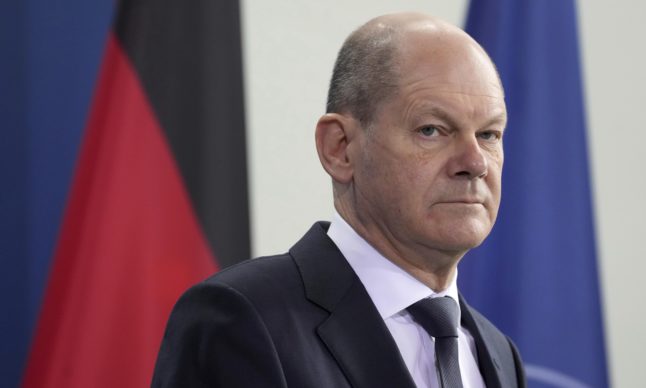The Chancellor held talks with German state leaders on Thursday to discuss the pandemic, as well as the war in Ukraine and how Germany can better manage and support refugees having to flee their homes.
It came as the German government gets set to drop almost all Covid measures on March 20th. Basic restrictions – like mandatory masks on public transport and in health settings will remain – as well as a ‘hotspot’ mechanism for bringing in tougher rules in areas where Covid cases build up.
The new slimmed-down Infection Protection Act is set to pass through the Bundestag and Bundesrat on Friday.
READ ALSO: The key Covid rule changes this week in Germany
But German states feel that they have been ignored and fear that the law changes planned by the coalition government will leave them with barely any options for combating the pandemic.
North Rhine-Westphalia premier Hendrik Wüst, who spoke by video link because he is in Covid isolation due to an infection, said the draft law was “legally uncertain and practically unworkable”.
Scholz defended the new law for Covid measures against criticism, saying it was a “legal basis on which to build for the future”.
However, Scholz also praised the “constructive discussion” with state premiers.
He said he was concerned about the high Covid infections. But the Chancellor said the situation in hospitals and intensive care units was not developing dramatically, and the Omicron variant resulted in less severe illness generally. Once again, he appealed to citizens to get vaccinated.
READ ALSO: How worried should we be about Germany’s rising Covid infections?
Earlier in the day, the Bundestag exchanged blows for the first time over a possible vaccine mandate in Germany.
MPs debated two bills and three motions for and against compulsory vaccination.
Several speakers warned of new restrictions on freedom in autumn without compulsory vaccination, while others said they were strictly against vaccine mandates.
Health Minister Karl Lauterbach (SPD) told MPs: “We can end the pandemic for Germany for the first time with compulsory vaccination. We’ll be in the same place in autumn as we are now if we don’t seize this unique opportunity together.”
Economics Minister Robert Habeck (Greens) said: “People in this country are fed up. Let’s finally get this pandemic over with, get rid of the virus and then return to freedom.”
Opposing views across parliamentary groups became clear.
Tabea Rößner, of the Green Party, said: “Many are afraid, some report strong reactions to vaccination.”
Left-wing politician Gregor Gysi said: “I was for it (vaccine mandate) with measles because that eradicated the disease, the (Covid) vaccine can’t do that here.”
MPs will vote on the mandate in April.
Support for refugees
After the talks on Thursday Scholz said that the federal and state governments were united and wanted to support refugees from Ukraine in Germany.
He admitted that “this will be a big, big challenge”.
Scholz said it was now a matter of providing help quickly and without complications, to make sure that refugees can work and that children can go to school “immediately”.
READ ALSO: German states call for more support in managing refugee crisis
Scholz also praised the “overwhelming culture of willingness to help” in Germany. According to the Interior Ministry 187,428 refugees have registered in Germany from Ukraine so far – but the real number is probably much higher.
Scholz pledged more funding to districts across Germany to help support people. A working group is to draw up a plan on this front by April 7th.
The Chancellor also emphasised that the invasion of Ukraine was “Putin’s war”. He said it was completely unacceptable for there to be any hostility against Russian people.



 Please whitelist us to continue reading.
Please whitelist us to continue reading.
Member comments